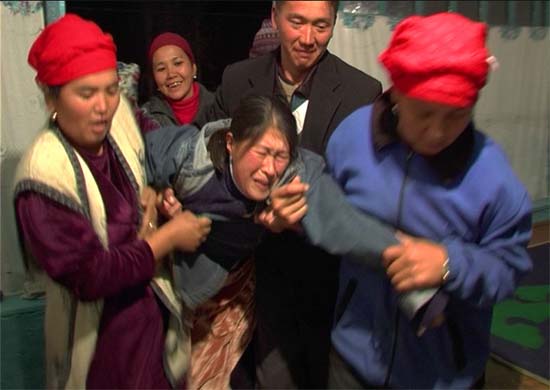
There is growing awareness in Kyrgyzstan that bride kidnapping is a significant problem. This is part of a growing concern about women's issues more generally. Kyrgyzstan signed the Convention on the Elimination of Discrimination Against Women in 1995, and there are numerous NGOs working on women's issues today. Nonetheless, my impression is that bride kidnapping is still a taboo subject in Kyrgyzstan, for many people will not recognize the extent of the practice, how common it is. Bride kidnapping was illegal under the Soviet Union, but apparently still did occur then. I spoke to villagers who were involved in kidnappings during these times. And I also heard stories about those who were imprisoned for taking part in kidnappings. The frequency of the custom has increased since Kyrgyzstan became independent in 1991. Some people think this is linked to a reassertion of Kyrgyz national identity and tradition. I'm not so sure about this theory -- I think "identity discourse" is a bit of a Western scholarly invention, or flavor of the day. What is certain, though, is that bride kidnapping is still very often perceived as a legitimate custom, and so though it is officially illegal now, it is hardly ever prosecuted.
Journalist Petr Lom traveled to the mountains of Kyrgyzstan to examine the practice of bride kidnapping
Interview With Petr Lom: Marriage by Abduction
Reporter Peter Lom
Caption: Norkuz -- a kidnapped Kyrgyz woman -- resists entering her future in-laws' home in the Kyrgyz village of Soviet.
An academic by trade, Petr Lom recently traveled to the mountains of Kyrgyzstan to examine the practice of bride kidnapping. In an email interview with FRONTLINE/World Web associate producer Sheraz Sadiq, Petr Lom reflects on making the transition from the ivory tower to filmmaking, the ethics of witnessing kidnappings and being 6 feet 8 inches tall in Central Asia.
This is your first foray into television. What's your background?
I have a Ph.D. from Harvard in political philosophy, and I teach at the Central European University in Budapest.
Can you describe how you first came upon the subject of bride kidnapping? What sparked your interest in finding out more about it?
I was researching Islamic extremism in Kyrgyzstan. During this work, I learned about bride kidnapping. It was much more interesting than Islamic extremism because it's a subject that touches the lives of most people in Kyrgyzstan. It's a lot more fun talking to couples about marriage and how they met. As soon as you start talking to someone in Kyrgyzstan about marriage, the subject will pop up. Imagine that you're having a conversation with someone, you ask them about their life, how they met their spouse. And they tell you that they kidnapped their wife. Or that their daughter has been recently kidnapped. Wouldn't you want to know more? I did.
Oddly enough though, there are almost no scholarly studies on the subject, and the international human rights community has given the subject almost no attention. I thought this odd and wanted to learn more.
What were some challenges or habits you had to overcome in making the transition from being an academic to filmmaking?
The greatest pleasure of making this film has been in acting almost entirely on intuition -- and that is not a faculty that you use much in the university!
On the other hand, academia is excellent preparation for editing. Instead of editing just words or arguments, in filmmaking you do that with pictures too. But the process feels quite familiar.
As for doing interviews and building relationships with your subjects while making a documentary, there certainly is a similarity with this and teaching. If you're a good teacher, you'd better be sensitive to your students and in tune with what they're feeling if you want to bring out the best in them.
I know you've made other trips to Kyrgyzstan before this one for your documentary on bride kidnapping. What were those experiences like? How did people react to you?
This was my fifth trip to Kyrgyzstan. I had been going to Central Asia on university publicity and recruiting trips since 2001, and so Kyrgyzstan was not an entirely new place.
I like Kyrgyzstan very much. People are very hospitable and very generous. We would always stay with the families we happened to be shooting that day. The biggest reaction I always get is to my height. I'm 6-foot-8. That's tall in most places, but extra tall in Kyrgyzstan, where the average height is, say, 5-foot-5.
This also made filming difficult because when I'm standing and holding the camera and someone looks at me instead of looking into the camera, it looks like they're looking way, way up into the sky. I have to crouch a lot.
Did you encounter any resistance in examining bride kidnapping?
Surprisingly, far less than I had expected. It took a lot of work to find the kidnappings, or rather, to be at a kidnapping when it's happening. We came across so many cases where villagers would tell us, "Oh, a kidnapping just happened an hour ago" or "A kidnapping just happened yesterday." But once we had found our subjects, it was not that difficult to get access to film them. Most people liked the attention. Kyrgyz people are also so hospitable and welcoming to foreigners that they usually wanted to help us out.
Many people were concerned that we wouldn't be "making fun of them." Kyrgyz people are a very proud people and would like Kyrgyzstan to come across in a positive light to the outside world.
The only real resistance we found was with one family. They had allowed us to film their family and a kidnapping. But then when the kidnapped girl refused to stay and left, the family thought it was my fault, that we had jinxed the process. They didn't let us film after that.
Is bride kidnapping seen as a widespread problem in Kyrgyzstan or is it Westerners who are primarily up in arms over this?
There is growing awareness in Kyrgyzstan that bride kidnapping is a significant problem. This is part of a growing concern about women's issues more generally. Kyrgyzstan signed the Convention on the Elimination of Discrimination Against Women in 1995, and there are numerous NGOs working on women's issues today. Nonetheless, my impression is that bride kidnapping is still a taboo subject in Kyrgyzstan, for many people will not recognize the extent of the practice, how common it is.
As for the Westerners? Quite frankly, there aren't too many Westerners up in arms about bride kidnapping. Internationally, the subject has had almost no attention.
One reason for this is still that the extent of bride kidnapping in Kyrgyzstan is just not recognized internationally as well. For example, the most recent U.S. State Department report on human rights practices in Kyrgyzstan says that around a dozen or so cases of kidnappings were reported in 2002. That number is just way off. And you realize that as soon as you start talking to local villagers.
Did being a man, and an outsider at that, affect how you approached this sensitive issue?
Of course. The only reason I was able to make this film was because Fatima, my translator and assistant, was a young Kyrgyz woman. Thanks to her, and through her, I was able to get access to my subjects. I would not have been able to speak to Kyrgyz women alone in the same way -- or even at all -- without Fatima. You have to remember that Kyrgyzstan is a very traditional society. For example, growing up, women are taught not to speak or even make eye contact with men they don't know.
Still, being an outsider made the job a little easier, to my surprise. Fatima would sometimes tell our subjects, "Don't worry about him," referring to me, "he doesn't speak Kyrgyz, he doesn't understand anything, you can tell me whatever you want. Pretend he's not even here." And they often would.
Tell us more about Fatima, your translator.
Fatima is a close friend of mine. She is extraordinarily intelligent and sensitive. She has the uncanny ability to make people drop their guard immediately and open up. I was very lucky to work with Fatima. I couldn't have made the film without her.
I first met Fatima in 2001 on a recruiting trip at her university, the American University in Bishkek. Last year, I became friends with her husband too. She had just graduated from university when I came to Kyrgyzstan this fall and was, luckily, free, so I hired her to work as my assistant.
Fatima's story itself is fascinating. She grew up in a small town in Kyrgyzstan, started learning English at only 16 and managed to get acceptance to the American University in Kyrgyzstan. She met Scott, her American husband, there. Her mother was initially against Fatima's marriage -- she was afraid Fatima would leave for the United States, and she would have preferred that she marry a local boy from her own village. Fatima's mom, who is also my dear friend now, arranged to have Fatima kidnapped. Fatima learned about the plans and instead quickly married Scott. And so when we were filming the kidnappings, Fatima knew that the fate of many of these girls could easily have been her own.
How did you find and get access to the women featured in the film?
I spent last winter in Kyrgyzstan. I had made friends in one village, which used to be called Marx and which has been renamed to Muddy Field since the post-Communist transition. A family there told me I should come back during "the kidnapping season," which occurs mainly after the harvest in the fall, when people have money and time to start thinking about marriage before the onset of winter. We followed one kidnapping preparation with the help of this family, but, unfortunately, we weren't able to get the kidnapping on film. We then started stopping at bus stations and taxi stands, where we asked around about prospective kidnappings. And that worked. Because most people don't have a car, and so when they plan to kidnap a girl, they hire a taxi. So taxi drivers are quite informed about when kidnappings will occur.
How and when did bride kidnapping begin? How is what we see today different from how it was originally practiced?
That's a difficult question. No one really knows. There are anthropological records of bride kidnappings dating back to the 19th century. The custom is clearly older than that, however. Some claim that the custom is tied to Kyrgyzstan's nomadic past. Kyrgyzstan literally means "the country of the 40 tribes." The story goes that these tribes used to raid each other's wives. Whether this is true, I don't know. Kyrgyzstan has an ancient epic poem, the Manas, which forms a central part of Kyrgyz oral tradition. Interestingly enough, bride kidnapping does not figure in this poem. So how old the tradition actually is, I don't know. What is certain, though, is that there has been some transformation in the custom. The mythology about kidnapping is that originally it was a Romeo and Juliet custom. In instances where the parents were against a marriage or where the groom could not afford the traditionally very high dowry, he would steal his true love. I personally didn't come across this kind of kidnapping today.
How prevalent is bride kidnapping in Kyrgyzstan and Central Asia? Is it more common in rural than in urban areas?
Bride kidnapping is pretty much exclusively a Kyrgyz custom in Central Asia. The practice occurs a bit in southern Kazakhstan, but this is quite near the Kyrgyz border, and it also occurs a little in rural Turkmenistan. The custom does not occur at all in the other countries of Central Asia, Uzbekistan and Tajikistan, which both border with Kyrgyzstan.
The most recent scholarly studies find that about a third of ethnic Kyrgyz marriages result from nonconsensual bride kidnapping.
I should caution that there are also merely ritual or symbolic kidnappings in Kyrgyzstan. The groom and bride are engaged, and the kidnapping is merely a game, along the lines of "Honey, I'll come and kidnap you next Tuesday at 2pm." The woman is still culturally expected to put up a fight and resist in these cases. To give you an example, there is a common proverb that says, "A good marriage should begin with tears."
Nonconsensual, or real, kidnapping is not very common in the capital of Bishkek. It is primarily a rural phenomenon. Nonetheless, if you go to the second largest city in Kyrgyzstan, Osh, where we did a lot of our filming, and you speak to even university girls, they will tell you that they do worry about being kidnapped, and even more so when they return to their homes in the villages.
What, in your opinion, accounts for its enduring practice and its increase following Kyrgyzstan's independence in 1991?
Bride kidnapping was illegal under the Soviet Union, but apparently still did occur then. I spoke to villagers who were involved in kidnappings during these times. And I also heard stories about those who were imprisoned for taking part in kidnappings. The frequency of the custom has increased since Kyrgyzstan became independent in 1991. Some people think this is linked to a reassertion of Kyrgyz national identity and tradition. I'm not so sure about this theory -- I think "identity discourse" is a bit of a Western scholarly invention, or flavor of the day. What is certain, though, is that bride kidnapping is still very often perceived as a legitimate custom, and so though it is officially illegal now, it is hardly ever prosecuted.
What is much more certain is that the increase of bride kidnapping is tied to poverty. Kyrgyzstan has suffered a lot during the transition from communism. Unemployment, particularly rural unemployment, is very high -- estimates put it as high as 40 percent. And there are similar estimates about the numbers of people living below the poverty line, around 40 percent. Because Kyrgyz marriages are traditionally very expensive, involving elaborate dowries and wedding feasts (there are often expectations to invite an entire village for a wedding feast), bride kidnapping has become a much more attractive option. If you kidnap a girl, you usually still have to pay a dowry, but the bride price is usually around a third lower.
One woman in your story who was kidnapped was clearly traumatized by the experience and left the house of her would-be in-laws under a hail of curses from the women of the house. Another woman who was kidnapped seemed almost happy or at least hopeful about her new life with her husband. So evidently a woman who is kidnapped can refuse the "marriage" while others accept it as "the Kyrgyz way" and even an affirmation of their beauty. Is there a range of attitudes and outcomes?
Yes, there are. We found cases ending in happiness, others ending in tragedy. One woman committed suicide after she had been kidnapped. Another became happily married.
We did come across cases where women refused to marry though they had been kidnapped. But this takes an extraordinary amount of courage and resilience. You must understand the tremendous social pressure upon girls to stay with their abductors once they have been kidnapped. A woman's place in Kyrgyz society is traditionally determined by being married and having many children. In addition to these expectations, there is also tremendous pressure on the girls to stay with their abductors and a real sense of shame and stigma should they leave. And finally, the Kyrgyz are very superstitious, and thus a curse upon a woman should she try to leave her kidnapper is very real to most people.
I would not say that Kyrgyz women think of kidnapping as an affirmation of their beauty. Rather, marriage generally, whether or not it involves kidnapping, is tremendously important for women in Kyrgyzstan, as family and marriage are central to women's roles and identities. This is why a woman can be kidnapped and be happy. You see this in the first story in our film, the story of Norkuz. Though she has another boyfriend, Norkuz is kidnapped by a man she has never dated and is forced to marry. Astonishingly, she is clearly very happy several days later when we came to visit her after the marriage. Why? Well, first, she was 25 and not married, and this is very old to be single in Kyrgyzstan (you're considered over the hill if you're over 22). Second, Bakyt, the groom who kidnapped her, is a good guy, reputed to be a decent and honest character. I liked him too. So Norkuz was lucky.
Certainly, it is extraordinarily challenging to our understandings and beliefs in individuality, choice and our Western romantic conceptions of true love to see a groom kidnap a woman he has never met in his life, and then to see the couple happy 24 hours later. I did a follow-up with one of these couples four months later: The woman is now two months pregnant, and the couple is happy and very much in love.
Does this justify kidnapping? Of course not. But the practice certainly raises some challenges to how many people in the West think about love.
Your film put you right in the middle of these kidnappings. Given the intense reactions of some of these girls, their protestations and tears, did you ever feel compelled to intervene?
Following and filming the kidnappings was extremely difficult emotionally and ethically. We did not intervene. But we tried to tell the girls that we were not on anyone's side, that we were documenting the practice, and told them that they would have to make up their own minds whether they would choose to stay or not. Is this sufficient justification? Not really. Deep down I think that filming some of the kidnappings was plain wrong. How do I justify my decision? I couldn't make the film otherwise, and I hope that in Kyrgyzstan -- where I hope that my film will be shown in every high school and university one day -- the film will do a lot more good than any harm I might have done. And finally, I was lucky, for in the actual kidnappings I documented, the women either found happy endings or did not stay with their abductors. If I had actually filmed the kidnapping of one of the stories of a woman who is kidnapped and then committed suicide, well, then, I don't know how I could have squared that with my conscience.
Do you get the sense that bride kidnapping poses a pressing threat to women's civil liberties in Kyrgyzstan?
Of course. But on the other hand, I think the film makes it quite clear that if anyone will change the practice, it will really be up to Kyrgyz women themselves, for as you can see, Kyrgyz women themselves play perhaps the most important role in the custom -- they are the ones who try to convince the abducted girls to stay.
In January, a group of NGOs active in women's rights in Kyrgyzstan submitted to the United Nation's Committee on the Elimination of Discrimination Against Women a report claiming that the government has been lax in protecting women's rights and that although bride kidnapping is technically illegal, the law is rarely enforced.
Who's active in this area and what's being done about it?
I wasn't aware of this report. But precious little is being done about bride kidnapping today. That's why I decided to make the film. Don't get me wrong: There are many very dedicated NGOs working on women's issues in Kyrgyzstan, and there is a lot to do, for Kyrgyzstan is still a very patriarchal, male-dominated society. But bride kidnapping has still not received a lot of attention, both domestically or internationally. This is slowly changing. For example, the UNDP (United Nations Development Programme) in Central Asia just had a seminar this past fall on the subject. I also received financial assistance for my own project from the Soros Foundation in Kyrgyzstan.
Have you heard any news from the women featured in the film?
Yes. I just did a follow-up trip, four months after I made the film. I met with one of the couples featured in the film. They're now happily married and expecting a child. My translator, Fatima, also recently met with Ainagul, the woman who refuses to stay with her abductor. She is back working where she was kidnapped from, selling vodka in a local kiosk. The other couple, the first story in the film, Bakyt and Norkuz, have left for Russia to try their luck in business. I hope to do more follow-ups with all of them in the future. I'm fortunate to say they have all become my friends.


















